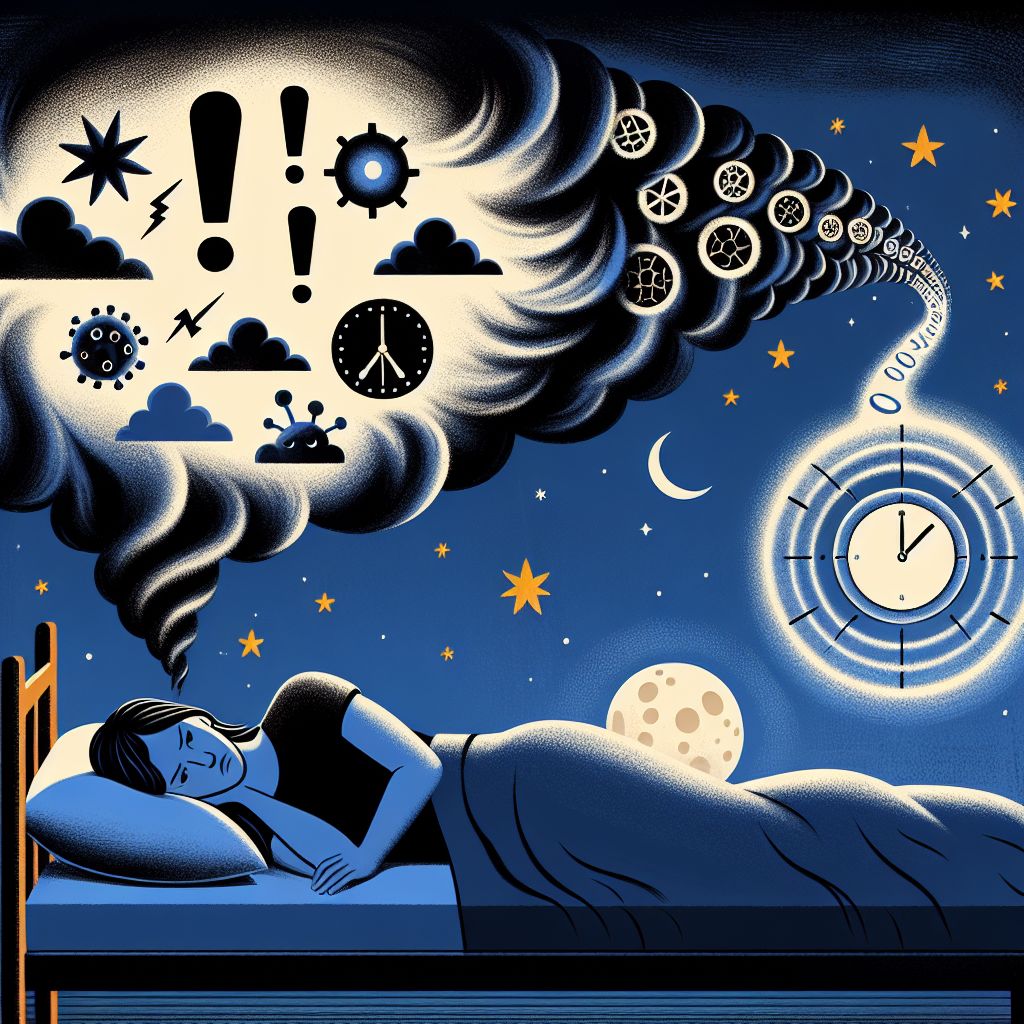Key Takeaways
-
Hormonal fluctuations during menopause can significantly disrupt sleep, but stress management can help.
-
Creating a cool, dark, and quiet sleep environment can enhance sleep quality.
-
Regular exercise and a balanced diet are key in managing menopause symptoms and improving sleep.
-
Herbal remedies like valerian root and chamomile may aid in relaxation and better sleep.
-
If sleep disturbances persist, consider cognitive behavioral therapy (CBT) or discussing hormone replacement therapy (HRT) with a healthcare provider.

Understanding Menopause and Sleep Disruptions
Menopause is a natural phase in a woman’s life, but it often comes with a host of challenging symptoms, including sleep disturbances. You might find yourself tossing and turning at night, waking up frequently, or feeling hot flashes that disrupt your slumber. But here’s the good news: there are ways to manage these sleep issues and improve your quality of rest.
The Link Between Hormonal Changes and Sleep Quality
During menopause, the body’s production of estrogen and progesterone decreases. These hormones aren’t just for reproduction; they also influence the sleep cycle. Lower levels of estrogen can make it harder to fall asleep and stay asleep. Moreover, progesterone, which has a calming effect, is also reduced, potentially leading to a restless night.
Common Sleep Disturbances During Menopause
-
Insomnia: Difficulty falling asleep or staying asleep throughout the night.
-
Night Sweats: Sudden intense hot flashes that can wake you from sleep.
-
Restless Leg Syndrome (RLS): Uncomfortable sensations in the legs that urge you to move them, which can occur more frequently during menopause.
Each of these issues can interfere with your ability to get restorative sleep, which is crucial for your overall health.
Let’s dive deeper into how we can manage these disruptions, shall we?
Chronic Stress and Its Impact on Menopause
Stress can be a significant factor in the severity of menopause symptoms. When you’re stressed, your body produces more cortisol, which can further unbalance your hormones and exacerbate menopausal discomforts. Besides that, chronic stress can also affect your sleep by making it difficult to relax and unwind at night.
Exploring the Stress-Sleep Connection
Think of stress and sleep as being on opposite ends of a seesaw. When stress levels are up, sleep quality tends to go down. It’s a delicate balance, and during menopause, this balance is often tipped. The result? You might lie in bed with your mind racing, unable to drift off to the peaceful sleep you need.
How Stress Hormones Exacerbate Menopause Symptoms
Cortisol, the stress hormone, is like fuel to the fire of menopausal symptoms. It can increase the frequency and intensity of hot flashes and night sweats, making it even harder to get a good night’s sleep. Therefore, managing stress is not just about feeling calmer; it’s about helping your body navigate the changes of menopause more smoothly.
For example, consider a study that showed women who engaged in regular mindfulness practices experienced fewer and less severe hot flashes. This indicates that stress-reduction techniques can have a tangible impact on menopausal symptoms.
In the next sections, we’ll explore effective strategies for reducing stress and improving sleep during menopause.
Stress isn’t the only factor that can affect your sleep during menopause. Your daily habits, including what you eat and how much you move, play a significant role as well. By making some adjustments to your nutrition and lifestyle, you can create an environment that’s more conducive to restful sleep.
Nutrition and Lifestyle Adjustments to Improve Sleep
What you eat and how you live your day-to-day life can have a profound effect on how well you sleep at night, especially during menopause. A few tweaks to your diet and routine may be just what you need to improve your sleep quality.
Optimizing Diet for Hormonal Balance
It’s no secret that a balanced diet is key to overall health, but did you know it can also help regulate hormones? Consuming a variety of fruits, vegetables, whole grains, and lean proteins can support your body’s natural hormone production. On the other hand, foods high in sugar and refined carbs can cause spikes in blood sugar and insulin levels, which may worsen sleep problems.
Here’s what to focus on:
-
Phytoestrogens: Foods like soy, flaxseeds, and sesame seeds contain plant-based estrogens that may help balance hormone levels.
-
Magnesium-rich foods: Dark leafy greens, nuts, seeds, and whole grains are packed with magnesium, which can improve sleep quality.
-
Hydration: Drinking enough water throughout the day can help manage hot flashes and prevent night sweats from disrupting your sleep.
-
Maca: this functional food is also an adaptogen and helps control most of the symptoms of menopause, especially hot flashes.
The Role of Exercise in Managing Stress and Sleep
Regular physical activity is a powerful stress-reliever. It can also help you fall asleep faster and deepen your sleep. Just be sure not to exercise too close to bedtime, as it can energize you and make it harder to fall asleep. Aim for at least 30 minutes of moderate exercise most days of the week, but listen to your body and adjust as needed.
Supplemental Support and Herbal Remedies
Sometimes, even with the best diet and lifestyle habits, you might need a little extra help to get the rest you deserve. That’s where supplements and herbal remedies come in.
When to Consider Supplements for Sleep
If you’ve tried improving your sleep hygiene and you’re still struggling with sleep, it might be time to consider supplements. Always consult with a healthcare provider before starting any new supplement, especially if you have underlying health conditions or are taking other medications.
Supplements to consider:
-
Melatonin: A hormone that regulates sleep-wake cycles, melatonin supplements can be helpful for some people with sleep disturbances.
-
Valerian Root: An herbal supplement that may improve sleep quality and ease anxiety.
-
Magnesium and Vitamin D: These nutrients work together to support bone health, which is important during menopause, and will also aid in better sleep. Do not use Calcium as a supplement when you have normal levels of Vitamin D because you will have more than enough Calcium for your needs.
An example of the effectiveness of herbal remedies can be seen in a study where participants who took valerian root reported improved sleep quality and decreased menopause-related sleep disturbances.
Herbal Allies for Calming the Nervous System
Herbs have been used for centuries to promote relaxation and sleep. Chamomile, for instance, is well-known for its calming properties and can be enjoyed as a tea before bedtime. Lavender is another herb that’s been shown to reduce stress and improve sleep quality. You can use it in essential oil form for aromatherapy or as a supplement.
Professional Interventions and Therapies
When lifestyle changes and natural remedies aren’t enough to improve your sleep during menopause, it might be time to seek professional help.
Navigating Hormone Replacement Therapy (HRT)
Hormone Replacement Therapy (HRT) can be an effective treatment for menopausal symptoms, including sleep disturbances. However, it’s not suitable for everyone and comes with potential risks. Discuss the benefits and risks of HRT with your healthcare provider to determine if it’s the right option for you.
Remember, menopause is a natural part of life, and you don’t have to navigate it alone. There are resources and treatments available to help you manage symptoms and maintain your quality of life. By taking charge of your health and making informed decisions, you can find relief from menopause-related sleep disturbances and stress.
Navigating Hormone Replacement Therapy (HRT)
For some women, the sleep disruptions caused by menopause call for more than lifestyle changes and natural remedies. Hormone Replacement Therapy (HRT) is a medical treatment that can replenish the hormones your body is missing. It’s a powerful option that has helped many women find relief from night sweats, hot flashes, and related sleep issues.
However, HRT isn’t a one-size-fits-all solution. The use of a “bioidentical hormone” strategy is rebounding in popularity after decades of negative press on estrogen.
Cognitive Behavioral Therapy (CBT) for Insomnia
If you’ve tweaked your diet, amped up your exercise, and tried every herbal tea in the store but still find yourself staring at the ceiling at 2 a.m., it might be time to explore Cognitive Behavioral Therapy (CBT) for insomnia. CBT is a type of therapy that helps you identify and change beliefs and behaviors that affect your ability to sleep. It teaches strategies to calm your mind and body, making it easier to drift off to dreamland.
Research has shown CBT to be incredibly effective for insomnia, and it can be especially beneficial for those going through menopause. By working with a therapist, you can learn how to manage the stress and anxiety that may be contributing to your sleep issues.
FAQ
Can Exercise Help With Sleep During Menopause?
Yes, exercise can be a game-changer when it comes to sleep during menopause. Physical activity promotes better sleep by helping to regulate your mood, decrease stress, and tire you out in a good way. Just be mindful of the timing; exercising too close to bedtime can actually make it harder to fall asleep.
Are There Natural Supplements Effective Against Menopausal Insomnia?
Indeed, there are several natural supplements that can help combat menopausal insomnia. For instance, melatonin supplements can regulate your sleep-wake cycle, while magnesium can help quiet the nervous system and prepare your body for sleep. Remember to consult with a healthcare provider before starting any new supplement regimen.
What Lifestyle Changes Can Reduce the Impact of Stress on Sleep?
Lifestyle changes that can help reduce the impact of stress on sleep include:
-
Establishing a regular sleep schedule
-
Creating a bedtime routine that promotes relaxation, such as reading or taking a warm bath
-
Limiting caffeine and alcohol intake, especially in the hours leading up to bedtime
-
Practicing mindfulness or meditation to help clear your mind
How Can Hormonal Changes Affect Sleep Patterns?
Hormonal changes during menopause can affect sleep patterns by disrupting the body’s natural circadian rhythm. The decline in estrogen and progesterone can lead to difficulty falling asleep, staying asleep, and reaching the deep, restorative stages of sleep.
When Should You Consider Professional Therapy for Sleep Issues?
If you’ve tried self-help strategies and over-the-counter remedies without success, it’s time to consider professional therapy for sleep issues. This is especially true if your sleep problems are affecting your daily life, causing you significant stress, or if you suspect they may be linked to another health condition.
Throughout each phase of menopause, remember that you’re not alone. Many women are navigating the same challenges, and there’s a wealth of support and resources available. By understanding the connection between stress, menopause, and sleep, you can take informed steps towards better nights and brighter days. Whether it’s through natural remedies, lifestyle changes, or professional therapies, restful sleep is within reach. So take heart, take action, and look forward to peaceful slumber.



